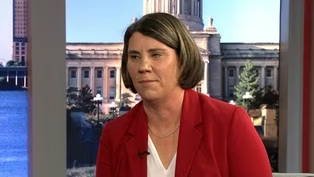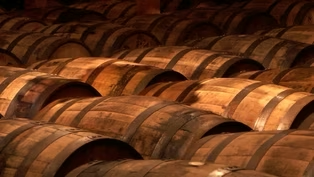
Soybean Farmer Pleads for U.S.-China Trade Deal
Clip: Season 4 Episode 74 | 3m 36sVideo has Closed Captions
President of American Soybean Association urging U.S. to make trade deal with China.
Caleb Ragland is president of the American Soybean Association and has recently become a fixture on national news, pleading his case for the U-S to reach a swift trade deal with China. Our Laura Rogers spent some time with Ragland on his LaRue County farm.
Problems playing video? | Closed Captioning Feedback
Problems playing video? | Closed Captioning Feedback
Kentucky Edition is a local public television program presented by KET

Soybean Farmer Pleads for U.S.-China Trade Deal
Clip: Season 4 Episode 74 | 3m 36sVideo has Closed Captions
Caleb Ragland is president of the American Soybean Association and has recently become a fixture on national news, pleading his case for the U-S to reach a swift trade deal with China. Our Laura Rogers spent some time with Ragland on his LaRue County farm.
Problems playing video? | Closed Captioning Feedback
How to Watch Kentucky Edition
Kentucky Edition is available to stream on pbs.org and the free PBS App, available on iPhone, Apple TV, Android TV, Android smartphones, Amazon Fire TV, Amazon Fire Tablet, Roku, Samsung Smart TV, and Vizio.
Providing Support for PBS.org
Learn Moreabout PBS online sponsorshipNow to continuing coverage on the plight of soybean farmers.
As trade talks continue between the U.S.
and China, a national advocate lives right here in Kentucky.
Caleb Ragland is president of the American Soybean Association and has recently become a fixture on national news, pleading his case for the U.S.
to reach a swift trade deal with China.
Our Laura Rogers spent some time with Ragland on his LaRue County farm.
Soybeans are the largest agricultural export from the United States and China, as our biggest customer historically has purchased more soybeans than all other export customers combined.
But that's come to a grinding halt.
There have been no U.S.
soybean sales to China since May, with none currently on the books.
That is a concerning trend long term, because you don't just snap your fingers and replace that large of a customer.
Because of tariffs, American soybeans are no longer price competitive compared to South American countries like Brazil and Argentina would be.
Unlike.
If you have the opportunity to fill your car with gas for $30 over here, or you can go across the street for 250 and it's pretty similar product.
You're probably gonna go for the cheaper price every time.
Caleb Ragland of Magnolia raises 1200 acres of soybeans he'll harvest in the next couple of weeks.
It's alarming when we should have had sales starting in August and here it is October.
We still don't have any sales.
We go very much longer and we bypassed our window of opportunity.
He says every day that goes by without a trade deal poses concern for both short and long term implications.
And as a soybean farmer, I absolutely am concerned about permanent loss of the Chinese market to the Brazilians.
Ragland says the Chinese market is critical.
They consume 61% of the world's soy among both their people and livestock, representing a large economic impact for the 500,000 soybean farmers and the United States.
We're very good as U.S.
soybean farmers at producing quality soybean for an economical price.
We just we need the markets and we need the opportunity to sell them.
The Trump administration says it plans to announce an aid package for those soybean farmers hard hit by the Chinese boycott.
Ragland says while it may be necessary, it's not ideal.
We don't need to be in a position where we need the government to come and bail out the market or to fix it.
We just simply need the government to stay out of the way.
But Ragland says he fears soybean farmers are, quote, falling on the sword for the greater good.
Our government is well aware of our plight.
Unfortunately, nothing has been done yet because I think that, quite frankly, we are the sacrificial lamb, along with other industries and so forth in this trade war.
As president of the American Soybean Association.
Caleb Ragland cites economists who say the average soybean crop will lose $109 an acre this year.
There's about 83 million acres of soybeans.
So you get into some big numbers there and over $100 an acre of economic loss.
It comes at a time when there are already economic hardships for farmers, like inflationary concerns.
Ragland hoping better times are ahead.
The American farmer is the best in the world.
If you don't do things to hold us back, to build artificial walls, to build barriers that hurt us and make us uncompetitive, we're going to do well.
For Kentucky Edition, I'm Laura Rogers.
Amy McGrath on Why She's Running Again for U.S. Senate
Video has Closed Captions
Clip: S4 Ep74 | 8m 45s | Amy McGrath talks with KET's Renee Shaw about why she's running for the U.S. Senate again. (8m 45s)
Christian Firm Wants More Social Media Guardrails
Video has Closed Captions
Clip: S4 Ep74 | 3m 7s | Firm is pushing Kentucky lawmakers for more social media guardrails to protect kids. (3m 7s)
Video has Closed Captions
Clip: S4 Ep74 | 3m 3s | Exploring the history of one of the oldest methods of transportation. (3m 3s)
Report Find Spirits Sales Falling
Video has Closed Captions
Clip: S4 Ep74 | 4m 3s | Exports of spirits, including bourbon, down by 9%. (4m 3s)
Providing Support for PBS.org
Learn Moreabout PBS online sponsorship
- News and Public Affairs

Top journalists deliver compelling original analysis of the hour's headlines.

- News and Public Affairs

FRONTLINE is investigative journalism that questions, explains and changes our world.












Support for PBS provided by:
Kentucky Edition is a local public television program presented by KET



